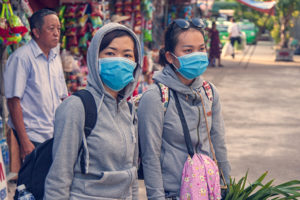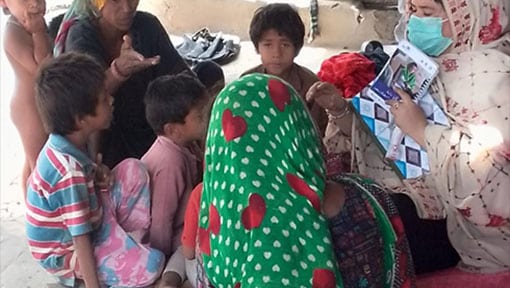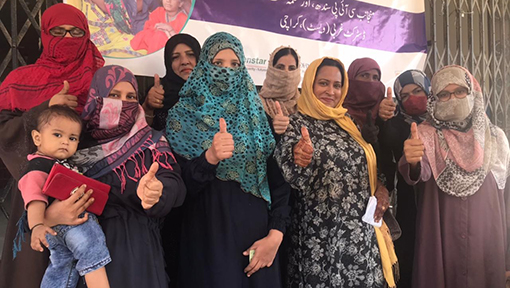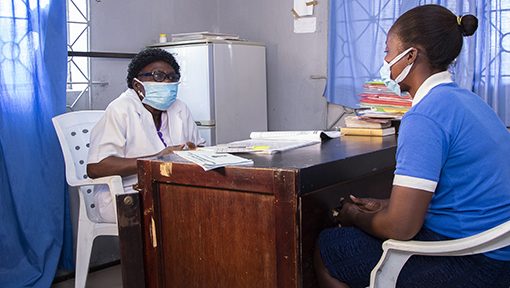Continuing to Provide Family Planning and AYSRH Services During COVID-19
 Contributors: Jessica Mirano and Maheen Malik
Contributors: Jessica Mirano and Maheen Malik
The COVID-19 virus is now present throughout the four regions of the world (East Africa, Francophone West Africa, India and Nigeria) where The Challenge Initiative (TCI) supports local governments in implementing its evidence-based family planning and adolescent and youth sexual and reproductive health (AYSRH) solutions. COVID-19 will likely impact the delivery of some contraceptive services during this period, but TCI expects its advocacy and demand generation activities, like mass media campaigns, to continue. TCI is already incorporating COVID-19 messages into its family planning efforts, such as in Bauchi State, Nigeria, where its work with religious leader champions includes messages related to coronavirus in addition to family planning.
One of the unique aspects of TCI is its focus on urban areas, in particular urban slums, so social distancing is a challenge for the communities in which it works. Global guidance also recommends against activities that require gatherings of 10 or more people so TCI has temporarily stopped any such activities and the TCI team is working from home across all four hubs. TCI has adapted its signature coaching model so it can continue to provide routine coaching and technical assistance remotely through phone calls, WhatsApp, Skype and other virtual platforms to its local government counterparts. In a few locations, TCI is still conducting one-on-one or group coaching with less than 10 people, while closely monitoring the rapidly evolving situation and adjusting accordingly.
TCI is also tracking family planning commitments with the understanding that funding may shift to address the COVID-19 situation. Other challenges to be expected are contraceptive supply chain interruptions. TCI will take advantage of virtual platforms and TCI University (TCI-U) online to continue adapting coaching and support at the city level for service delivery, demand-generation and advocacy work in family planning with integration of COVID-19 messages.
TCI-U will be enhanced with COVID-19 materials and resources related to the provision of family planning services. An infection prevention module on TCI-U will be broadened to add components on preventive measures to avoid transmission of COVID-19 when providing services. In East Africa and Nigeria, TCI is already working with pharmacies to provide proper family planning messages and to refer clients to health clinics as needed. TCI will further strengthen its work with pharmacies in providing correct family planning messages and referrals to health centers as needed, which is a critical service delivery point at this time since they remain open in most countries.
TCI’s work supporting local governments in the provision of post-partum family planning services will be strengthened to maintain this viable entry point for family planning services. Since hospitals and health centers are expected to remain open to provide essential services, TCI will continue to conduct whole-site orientations virtually to orient all staff – clinical and non-clinical – who are working in the health facility to become advocates for family planning. TCI will also support continued commodity distribution by ensuring community health workers (CHWs) have adequate supplies of family planning commodities and by integrating family planning messaging and distribution in outpatient departments of health facilities.
TCI has also strengthened CHWs’ capacity to deliver health messages in an effective manner and can be contacted by phone for advice or guidance on family planning. Updated materials with COVID-19 messaging will be provided to CHWs.
TCI will continue its advocacy work with local governments leaders (through virtual meetings) to emphasize the importance of continuing family planning service during this period, as evidence shows fertility rates increase after a crisis.
TCI’s lead organization, The Bill & Melinda Gates Institute for Population and Reproductive Health, has created a searchable database to house a wide range of COVID-19 resources related to family planning and reproductive health including: action initiatives, best practices and tools, community insight, government initiatives, research and academic publications, news/media, op-eds, multilateral initiatives, funding and grant opportunities, and online events/webinars.
By reducing unplanned pregnancies, as well as diminishing allied morbidity and mortality, family planning can help reduce the burden placed on overwhelmed health systems caring for COVID-19 patients.






